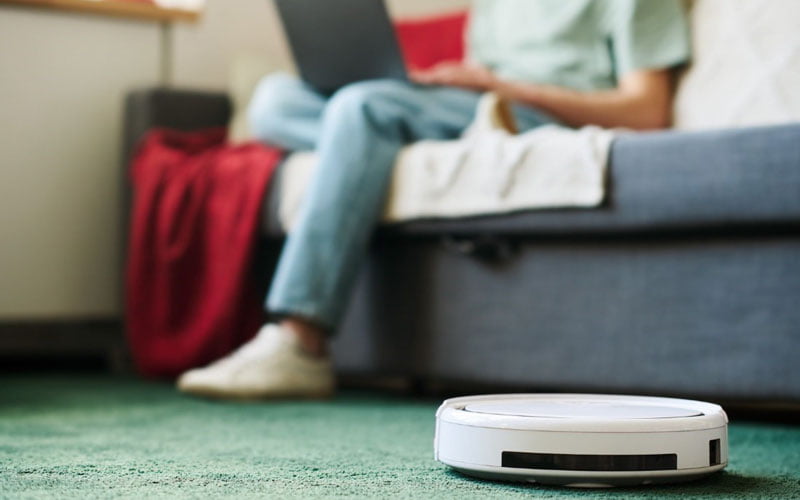In the fast-paced world we live in today, household chores often take a back seat. The advent of technology has offered solutions, and one such innovation making waves is the robot vacuum cleaner. Let’s delve into the advantages and disadvantages of these futuristic cleaning companions.
Robot vacuum cleaners, colloquially known as robovacs, are automated devices designed to clean floors effortlessly. As technology evolves, these gadgets have become a staple in modern households. Now, let’s explore why they have gained immense popularity.
Discover solutions to the common issue of your Shark robot vacuum not turning on. Click here: https://verywellhome.com/my-shark-robot-vacuum-wont-turn-on/ and revive the cleaning power of your Shark robot vacuum.
Advantages of Robot Vacuum Cleaners
Time Efficiency
Robot vacuum cleaners captivate users with their time-saving prowess. Envision a scenario where these devices effortlessly tidy up your floors, granting you the freedom to concentrate on other responsibilities. Their adept navigation ensures a consistently clean home, liberating you from the need for constant oversight.
Precision Cleaning
Featuring cutting-edge sensors, robot vacuum cleaners showcase exceptional cleaning precision. They adeptly access narrow corners and beneath furniture, ensuring every inch receives thorough cleaning. This level of accuracy distinguishes them from conventional vacuum cleaners, providing a more meticulous and comprehensive cleaning solution for your living space.
Ease of Use
In contrast to traditional models, robot vacuum cleaners prioritize user-friendliness. Their intuitive controls cater to users of varying technological proficiency, ensuring effortless operation even for those less familiar with technology. This minimal need for human intervention positions them as a preferred option for individuals with hectic schedules, offering convenience without compromising efficiency in maintaining a tidy home.
Smart Features
Contemporary robovacs transcend mere cleaning tools; they embody the essence of the smart home era. Seamlessly integrating with home automation systems, these devices empower users to remotely manage their functionality. Furthermore, the provision of customizable cleaning schedules caters to the diverse preferences of individuals, adding a personalized touch to the cleaning experience and aligning with the broader trend of smart and interconnected living spaces.
Energy Efficiency
Worried about soaring electricity costs? Robot vacuum cleaners provide a solution through their energy-efficient design. The incorporation of optimized cleaning algorithms and reduced power consumption not only ensures effective cleaning but also aligns with environmental sustainability. These innovations not only alleviate financial concerns but also contribute positively to the broader goal of minimizing energy consumption and fostering a greener, more eco-friendly approach to home maintenance.
Disadvantages of Robot Vacuum Cleaners
Initial Cost
While the benefits are enticing, the initial cost of robot vacuum cleaners may deter some consumers. It’s essential to weigh the upfront investment against the long-term convenience they offer.
Maintenance Challenges
Regular maintenance is crucial for optimal performance. Cleaning sensors and brushes, along with staying updated on software, can be time-consuming. Users must consider these factors before investing in a robovac.
Limited Cleaning Power
For heavy-duty cleaning tasks, traditional vacuums still hold an edge. Robot vacuum cleaners might struggle with deep-seated dirt or larger debris. Understanding their limitations is vital for realistic expectations.
Dependency on Technology
Relying on technology comes with its set of challenges. Robot vacuum cleaners are not immune to technical glitches, and with rapid advancements, they may become obsolete sooner than expected. This raises questions about long-term reliability.
Lack of Human Judgment
Despite advanced sensors, robovacs lack the nuanced judgment humans possess. They may struggle with unexpected obstacles and might not adapt well to sudden changes in the cleaning environment.
Overcoming Challenges
Technological Advances
The landscape of robot vacuum cleaners is undergoing continuous transformation, primarily propelled by relentless technological advancements. The evolution of sensor technology plays a pivotal role, ensuring that these automated devices navigate and clean with unprecedented precision. Simultaneously, artificial intelligence is ushering in a new era, enhancing the cognitive capabilities of robovacs. As AI algorithms become more sophisticated, the machines’ ability to learn from their surroundings and adapt to different cleaning scenarios improves significantly.
Affordability
The initial barrier of high costs associated with robot vacuum cleaners is gradually eroding. Market dynamics are shifting towards greater affordability, driven by increased competition among manufacturers. As demand rises and technology becomes more commonplace, consumers can expect a broader range of options at varying price points. This shift not only makes robot vacuum cleaners more accessible but also ensures that individuals with diverse budget constraints can enjoy the benefits of this innovative cleaning technology.
Maintenance Solutions
Acknowledging the concerns related to maintenance, manufacturers are proactively addressing these challenges. User-friendly designs are at the forefront of this initiative, making it easier for users to perform routine maintenance tasks without undue complexity. Additionally, cloud-based updates represent a modern solution to the perennial issue of software maintenance. This approach ensures that users can seamlessly update their robovacs, keeping them at the cutting edge of functionality without the need for manual intervention.
Future Outlook
Integration with IoT
The future of robot vacuum cleaners is intricately tied to the expansive realm of the Internet of Things (IoT). Envision a seamlessly connected household where your robovac collaborates effortlessly with other smart devices. This integration not only streamlines the cleaning process but also contributes to an overall synchronized home automation experience.
AI Advancements
Artificial intelligence is poised to be a transformative force in the trajectory of robovacs. The upcoming wave of AI enhancements will endow these devices with learning capabilities, enabling them to adapt and evolve. From recognizing specific cleaning patterns to dynamically responding to changes in their environment, the future holds a promise of more intelligent and efficient robot vacuum cleaners.
Conclusion
In conclusion, the advantages of robot vacuum cleaners are evident, offering time efficiency, precision cleaning, ease of use, smart features, and energy efficiency. However, challenges such as initial cost, maintenance, limited cleaning power, dependency on technology, and lack of human judgment should be considered. As technology progresses, solutions are emerging, making robovacs a promising addition to modern households.
















